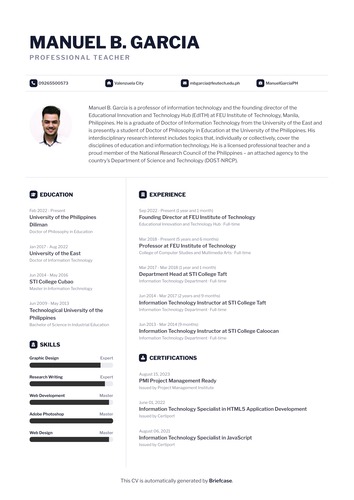Are you ready to introduce yourself?
Show the world what you're made of 💪
Effortlessly showcase your accomplishments because being awesome 😎 deserves a spotlight.
Create
Effortlessly build an online portfolio to showcase your accomplishments.
Share
Share your online portfolio and broadcast your successes to the world.
Connect
Expand your professional circle and forge meaningful relationships.
Building Your Career, One CV at a Time
Create Your Professional CV
Say goodbye to the hassle of manual formatting and updates, and start elevating your professional journey with Briefcase's automatic CV generator.
Seamlessly convert your achievements, skills, and experiences into a polished document suitable for job applications, interviews, and networking.


Streamlined Process
Save time and effort by automatically converting your online portfolio content into a well-structured CV.
Professional Formatting
Your CV will maintain a professional look and feel, ensuring you make a strong impression on potential employers.
Versatile Usage
Use your CV for job applications, networking, or any situation where you need to showcase your qualifications.
Always Up-to-Date
Your CV stays current with your latest achievements as you update your portfolio, eliminating the need for manual updates.
Spotlight on Briefcase Users
Here are a few of the incredible tamaraws who have embraced our platform to showcase their skills and accomplishments.
Ronel Zimbry V. Banawa
BSITDA student at FEU Institute of Technology
Jomer C. Santos
CPE associate at FEU Alabang
Gabriel Jonathan C. Laoang
Motivated Accounting Student Aspiring to be a CPA
Ma. Angelie C. Magistrado
BSCE student at FEU Institute of Technology
Janna Rane C. Rosendo
BSCSSE Undergraduate • Future Software Engineer • Front-End Designer
Robert Gabriel M. Flores
Computer Science Student | Aspiring Software & Data Engineer
Princess Diane L. Cruz
BS in Civil Engineering with Specialization in Structural Engineering
Francis Andre M. Arreza
BMA student at FEU Institute of Technology
Frequently Asked Questions
Ready to show the world?
Join the movement of tamaraws who showcase their accomplishments and show the world what they're made of.
Get started — it’s freeJoin 18891 tamaraws today and start showcasing.

